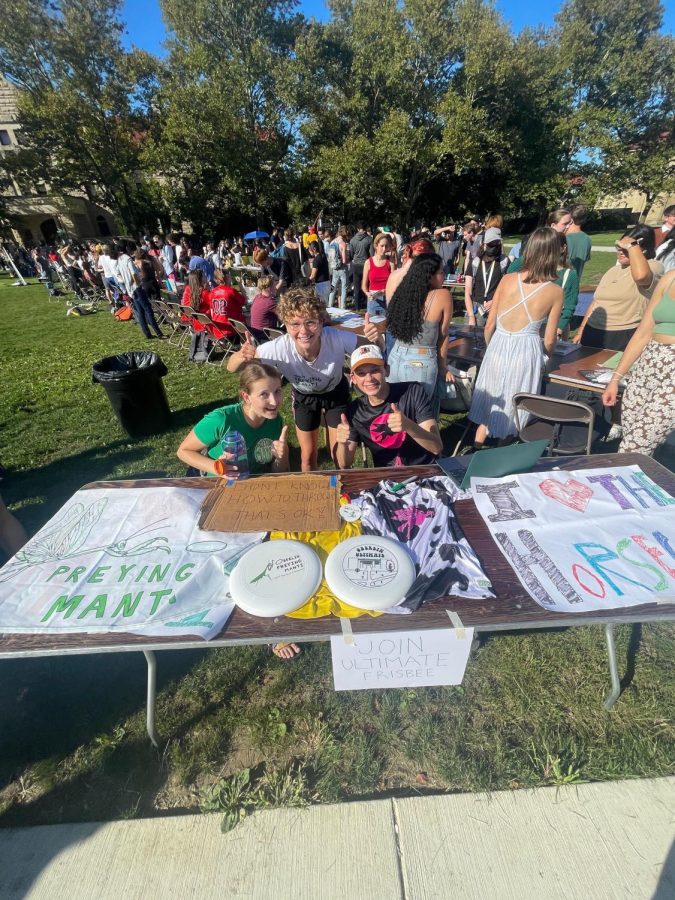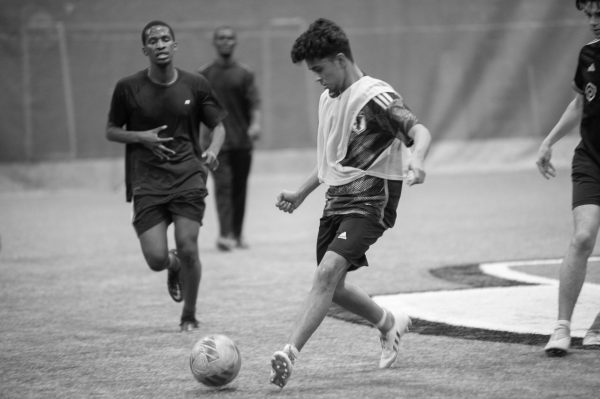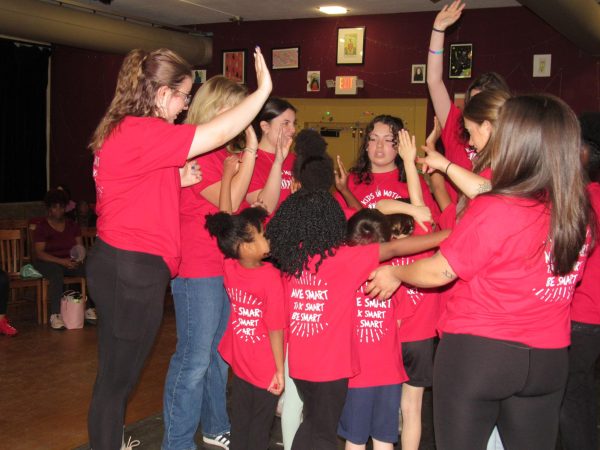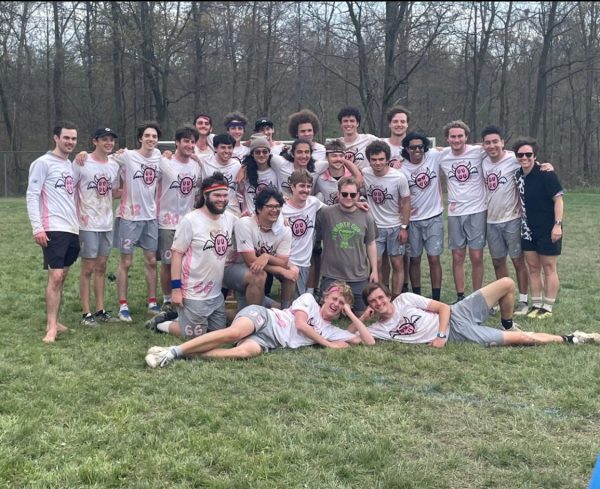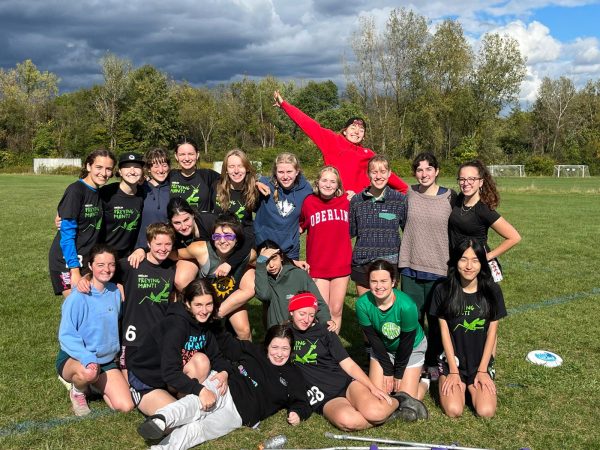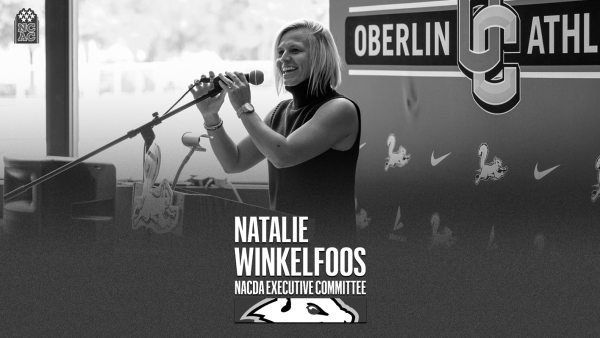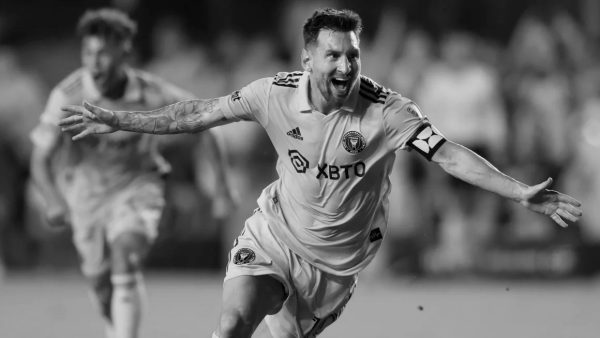Oberlin Athletes Shine in Club Sports
Frisbee members pose behind a booth at this year’s Connections Fair.
Although not officially recognized by the NCAA, club sports can get pretty rigorous and competitive. There has been a history of Division III athletes participating in club sports during the offseason at Oberlin College, and no matter the varying levels of ability among the players, these teams focus on having fun with the sport while training intensely.
The oldest club sport on campus is the Fencing Club, the Flaming Blades. Newcomers who want to learn how to fence can join FenceCo, an ExCo that introduces them to the exhilarating sport. More experienced fencers can join the Flaming Blades and compete around the Midwest. In its recent history, the Flaming Blades has sent members to the Midwestern Fencing Conference, the Collegiate Club Fencing Championships, and two other tournaments hosted by The Ohio State University and Case Western Reserve University. At Case Western’s duel last year, fourth-years Illuin Darlington-Bai and JJ Wroblewski, as well as Arman Luczkow, OC ’22, placed in saber. However, most members of the club fence against each other.
“[The Blades] like to approach it as something fun and interesting to do, rather than in the hyper competitive spirit that many sport fencers embrace,” College fourth-year and club member Desmond Hearne Morrey said.
Oberlin’s club sports scene also boasts a successful ultimate Frisbee program. In 2019, the women’s and trans ultimate team, the Preying Manti, won Division III nationals. In fact, two members from that year’s team ended up playing for the USA National Ultimate Team. In most cases however, many people who join the women’s and trans team haven’t played the sport before. College third-year Amelia Sterling-Angus is one of the few who played competitive Frisbee before coming to Oberlin.
“A lot of people come in not knowing how to throw a disc,” Sterling-Angus said. “You can improve really quickly if you’re committed to it, though.”
Following the Preying Manti’s success, the men’s open ultimate team, the Flying Horsecows, went to nationals last season and earned fifth place among the Division III colleges. College fourth-year captain Jack Povilaitis, also known as “Jack Hands,” mentioned that the countless hours the members spent playing with each other contributed to their progression to nationals. The team also found success from developing the A and B team system that is similar to a varsity and junior varsity setup. Like many Horsecows and Manti members, Povilaitis came in not knowing how to throw a Frisbee.
“Most players want to continue doing something athletic after high school or want to start,” Povilaitis said. “One of our top scorers now played soccer in high school, and one of the captains last year… didn’t know how to throw at first [and] became one of the best players on the team.”
Second-year Josh Willmore is a varsity athlete on the football team, but is still able to prioritize the Horsecows off the football field. Many Frisbee players have other priorities, but the flexibility of club sports allows them to participate when they can. Willmore believes that Frisbee has helped his football skills, and has seen improvement since his last season. Sometimes he goes to football practice during the day and then throws Frisbee at night with the rest of the team. Willmore isn’t the only varsity athlete who has made time for club sports. Third-year field hockey captain Susan Robinson-Cloete participated in rugby events such as rugby prom, and third-year Adrienne Sato, who is on the women’s soccer team, practiced with the ice hockey club.
Rugby is one of the most rigorous club sports on any college campus — the women’s and trans team, the Rhinos, and the men’s team, the Gruffs, play against other schools within the region for tournaments and scrimmages. Last season, the Gruffs attended the Allegheny Rugby Union Spring 7s Championship and won the tournament’s Spoon championship. Likewise, the Rhinos played against nearby colleges such as Kenyon College and Baldwin Wallace University.
All Obies, whether they are just looking to kick and throw a ball or are a DIII athlete looking to play another sport on the side, have the option of club sports to have fun and compete extensively. The flexibility of club sports allows students to engage with athletics while maintaining their regular schedules. These clubs not only form a culture of support but also push their members to improve their skills. From fencing to ultimate Frisbee to rugby, students can take a shot at sports they have never tried before and discover a new talent.


